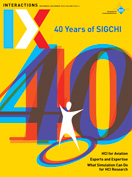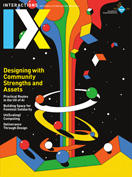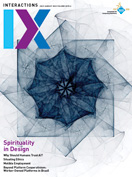Authors: Juan Hourcade
Posted: Fri, August 02, 2013 - 2:56:52
For the past three years, members of the human-computer interaction community interested in using computing technologies to promote peace and prevent conflict have been meeting as part of HCI for Peace, a grassroots initiative. Our aim is to highlight and celebrate work already done to this end and to encourage further work with peace as its explicit goal. We hope this call to action starts some community-wide discussions from which positive action can spring: Our world can be no brighter than the worlds we dream of. The HCI community is uniquely positioned in the computing world to effect change in this area. its focus not only on the user sitting in front of a screen, but on the effect of technology on humanity at a societal and global scale.
In this blog post I summarize the outcomes of the latest HCI for Peace meeting at CHI 2013, when about 20 attendees met as part of a SIG titled “HCI for Peace Ideathon.” It was an opportunity for like-minded researchers and practitioners to exchange ideas, experiences, and think of future opportunities.
The participants split into four groups to discuss different topics that were later shared with the entire group. The first group focused on how interactive technologies may play a role in problem formulation in order to resolve conflicts. Some ideas that were discussed included ensuring a diversity of people were involved in conflict resolution (to develop more alternative solutions), encouraging differences of opinion, and arriving at a wide set of solutions early on. Additional discussion focused on the role of media in how positive cooperation is much less likely to be reported than violence, providing a skewed (and scarier) view of the world. The group developed an idea for media and storytellers where stories from each group in a conflict that include the same values could be merged by storytellers and propagated to both sides to show similarities.
The second group discussed citizen journalism. This group included a member from witness.org who discussed their app to support witnesses recording video of sensitive areas. The app gathers metadata that can be used to validate that video was recorded at the time and place claimed by the recorder. While the idea behind the app is to record and broadcast violent acts to deter their occurrence, there was also the suggestion that it could be used to cover positive aspects, reinforcing peace messaging and positive action.
A third group discussed recent applications (e.g., the NNR table) that use shared interactive spaces for conflict resolution. In these spaces the two parts have to work together to make something happen. Working together makes both parts benefit while not collaborating leaves both parts stuck. The NNR table was recently evaluated with Israeli and Palestinian youth with positive results.
The fourth group discussed what HCI researchers and practitioners could do to have an impact on the precursors of conflict. One issue that came up was the need to share the empirical research on these precursors, as it is not well known. This would be important not only for HCI people, but for the public in general. HCI researchers and practitioners could play a role, for example, in helping the public understand the warning signs of upcoming conflict using accessible visualizations. We also discussed the role of social media in escalating or de-escalating conflict.
Ben Shneiderman made a call at the end of the session to introduce into the HCI curriculum the role interactive technologies can play in preventing conflict and promoting peace.
What would you propose? What are some ways in which interactive technologies could prevent conflict and promote peace? To join the discussion visit hciforpeace.org, join our facebook community, or follow us on twitter @hciforpeace.
Posted in: on Fri, August 02, 2013 - 2:56:52
Juan Hourcade
View All Juan Hourcade's Posts






Post Comment
No Comments Found